| Srl | Item |
| 1 |
ID:
106380
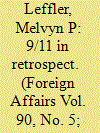

|
|
|
| 2 |
ID:
106382
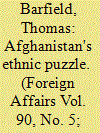

|
|
|
|
|
| Publication |
2011.
|
| Summary/Abstract |
In 2001, fearing ethnic strife, the international community pushed for a strong central government in Kabul. But such fears were based on a false reading of Afghan history and fostered a system of regional and ethnic patronage. To correct matters, the United States should de-emphasize Afghanistan's ethnic fault lines and push for more devolved and inclusive governance.
|
|
|
|
|
|
|
|
|
|
|
|
|
|
|
|
| 3 |
ID:
106379
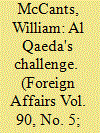

|
|
|
|
|
| Publication |
2011.
|
| Summary/Abstract |
On 9/11, the global jihadist movement burst into the world's consciousness, but a decade later, thanks in part to the Arab Spring and the killing of Osama bin Laden, it is in crisis. With Western-backed dictators falling, al Qaeda might seem closer than ever to its goal of building Islamic states. But the revolutions have empowered the group's chief rivals instead: Islamist parliamentarians, who are willing to use ballots, not bombs.This article appears in the Foreign Affairs eBook, "The U.S. vs. al Qaeda: A History of the War on Terror." Now available for purchase.
|
|
|
|
|
|
|
|
|
|
|
|
|
|
|
|
| 4 |
ID:
106388
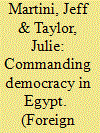

|
|
|
|
|
| Publication |
2011.
|
| Summary/Abstract |
Despite its vows to speed Egypt toward elections, the country's military leadership is actually ambivalent about democracy. Above all, Egypt's generals want to preserve stability and protect their privileges. But having unleashed democracy, the military may not be able to control it -- especially if Washington keeps up the pressure to move forward.
|
|
|
|
|
|
|
|
|
|
|
|
|
|
|
|
| 5 |
ID:
106377


|
|
|
|
|
| Publication |
2011.
|
| Summary/Abstract |
European leaders feel they have a right and duty to solve the Israeli-Palestinian conflict. Perhaps -- but they're just not up to the task. Europe should focus instead on what it does best: helping the Palestinians build a state.
|
|
|
|
|
|
|
|
|
|
|
|
|
|
|
|
| 6 |
ID:
106383
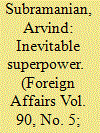

|
|
|
|
|
| Publication |
2011.
|
| Summary/Abstract |
Is China poised to take over from the United States as the world's leading economy? Yes, judging by its GDP, trade flows, and ability to act as a creditor to the rest of the world. In fact, China's economic dominance will be far greater and come about far sooner than most observers realize.
|
|
|
|
|
|
|
|
|
|
|
|
|
|
|
|
| 7 |
ID:
106381
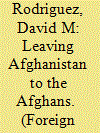

|
|
|
|
|
| Publication |
2011.
|
| Summary/Abstract |
The Afghans will indeed be ready to take over their own security by 2014, writes the former commander of the ISAF Joint Command. The size and quality of Afghanistan's armed services have increased drastically over the last few years, and the United States' decision to focus on good local governance, especially in key areas, has pacified the most important parts of the country.
|
|
|
|
|
|
|
|
|
|
|
|
|
|
|
|
| 8 |
ID:
106384
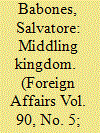

|
|
|
|
|
| Publication |
2011.
|
| Summary/Abstract |
Sure, China's economic growth has been unprecedented, even miraculous. But the country is unlikely to keep up its breakneck pace. Instead, China's growth should level out soon, returning to rates more like those of comparable middle-income countries, such as Brazil, Mexico, and Russia.
|
|
|
|
|
|
|
|
|
|
|
|
|
|
|
|
| 9 |
ID:
106378
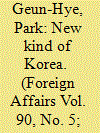

|
|
|
|
|
| Publication |
2011.
|
| Summary/Abstract |
Two trends represent Korea today: South Korea's extraordinary economic boom and North Korea's stagnation and provocation. To move the peninsula forward, writes one of South Korea's leading politicians, regional and international players must take a bolder and more creative approach to achieving security.
|
|
|
|
|
|
|
|
|
|
|
|
|
|
|
|
| 10 |
ID:
106386
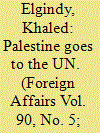

|
|
|
|
|
| Publication |
2011.
|
| Summary/Abstract |
The Palestinian plan to ask the UN for statehood in September has provoked intense anxiety in Jerusalem and Washington. But the move is less provocative than commonly thought. Palestinian leaders are not aiming at short-circuiting the peace process; they are trying to level the playing field in order to promote future negotiations with Israel and the United States.
|
|
|
|
|
|
|
|
|
|
|
|
|
|
|
|
| 11 |
ID:
106385
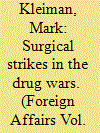

|
|
|
|
|
| Publication |
2011.
|
| Summary/Abstract |
Neither intensifying the drug war nor legalizing all drugs offers much hope of reducing drug abuse in the United States or lessening violence in Mexico. The key to changing outcomes on both sides of the border is changing the incentives facing dealers and users.
|
|
|
|
|
|
|
|
|
|
|
|
|
|
|
|
| 12 |
ID:
106389


|
|
|
|
|
| Publication |
2011.
|
| Summary/Abstract |
Japan is undergoing profound changes that are empowering its political leadership at the expense of its bureaucracy. But rather than bringing about a clean transfer of institutional authority, the reforms have created gridlock. The U.S.-Japanese alliance isn't dead, but it is getting more complicated.
|
|
|
|
|
|
|
|
|
|
|
|
|
|
|
|
| 13 |
ID:
106387


|
|
|
|
|
| Publication |
2011.
|
| Summary/Abstract |
To understand the Brotherhood's prospects in Egypt's upcoming elections, one has to understand the organization itself. This intensely disciplined operation has an intricate system for recruitment and promotion and a devoutly loyal membership -- one likely to triumph at the polls and move Egypt in a decidedly theocratic, anti-Western direction.
|
|
|
|
|
|
|
|
|
|
|
|
|
|
|
|
| 14 |
ID:
106376
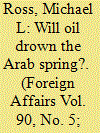

|
|
|
|
|
| Publication |
2011.
|
| Summary/Abstract |
No state with serious oil wealth has ever transformed into a democracy. Oil lets dictators buy off citizens, keep their finances secret, and spend wildly on arms. To prevent the "resource curse" from dashing the hopes of the Arab Spring, Washington should push for more transparent oil markets -- and curb its own oil addiction.
|
|
|
|
|
|
|
|
|
|
|
|
|
|
|
|